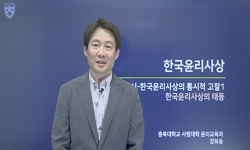The modernization of Confucianism is the most active among fields of Confucian Studies in Korea. Modernization of Confucianism in Korea is distinctive from that of other countries in involvement of Confucian philosophers as well as social scientists. ...
http://chineseinput.net/에서 pinyin(병음)방식으로 중국어를 변환할 수 있습니다.
변환된 중국어를 복사하여 사용하시면 됩니다.
- 中文 을 입력하시려면 zhongwen을 입력하시고 space를누르시면됩니다.
- 北京 을 입력하시려면 beijing을 입력하시고 space를 누르시면 됩니다.
부가정보
다국어 초록 (Multilingual Abstract)
The modernization of Confucianism is the most active among fields of Confucian Studies in Korea. Modernization of Confucianism in Korea is distinctive from that of other countries in involvement of Confucian philosophers as well as social scientists. While Confucian philosophers attempt to reformulate Confucianism criticizing obsolete part of it and discover a post-modern answer in Confucianism , social scientists try to put fingers on Confucian factors of social development in East Asia and use Confucianism for establishing new paradigm of social science. In other words, Confucian philosophers focus on revitalizing Confucianism while social scientists pursue new social science. As on the part of Confucian scholars, knowledge of modem social sciences is insufficient; social scientists that do not have deep understanding of Confucianism often show lack of proper knowledge and even distort some Confucian doctrines. Yet interdisciplinary cooperation between Confucian philosophers and social scientists will remedy defects and flourish in the future. Toegye, Yulgok, Dasan, and Hyegang have been the favorite thinkers for researchers of Korean Confucianism, which continues for a while. Yet studies on newly discovered Confucian scholars will increase in near future. As studies on Confucianism of early Joseon era have accumulated, those of late Joseon can be augmenting in the future. Studies on Chinese philosophies will keep its pace, while comparative studies on Chinese philosophy can be increased because many scholars trained in western institutions is on the rise. Interests regarding Japanese philosophy, even slowly increasing, can be seen among scholars. East Asian perspective in Humanism, advocated by scholars mainly in Sungkyunkwan University, becomes active recent years. It insists pan-East Asian perspective overcoming national boundaries is needed for deeper understanding of East Asian culture. For Confucian studies, East Asian perspective not being reflected so far can be adopted for further studies. For example, comparative study on commentaries of Confucian classics looks prospective enhancing collaborations among international scholars.
동일학술지(권/호) 다른 논문
-
“虛假文人”現象--儒家美學范式在朝鮮后期藝術社會學里的意義和价値
- 성균관대학교 유교문화연구소
- 임태승
- 2006
-
- 성균관대학교 유교문화연구소
- 윤사순
- 2006
-
- 성균관대학교 유교문화연구소
- 황종원
- 2006
-
- 성균관대학교 유교문화연구소
- 川原秀城
- 2006
분석정보
인용정보 인용지수 설명보기
학술지 이력
| 연월일 | 이력구분 | 이력상세 | 등재구분 |
|---|---|---|---|
| 2027 | 평가예정 | 재인증평가 신청대상 (재인증) | |
| 2021-01-01 | 평가 | 등재학술지 유지 (재인증) |  |
| 2018-12-20 | 학술지명변경 | 한글명 : 國際版<儒敎文化硏究> -> Journal of Confucian Philosophy and Culture외국어명 : 미등록 -> Journal of Confucian Philosophy and Culture |  |
| 2018-01-01 | 평가 | 등재학술지 유지 (등재유지) |  |
| 2015-01-01 | 평가 | 등재학술지 유지 (등재유지) |  |
| 2011-06-13 | 학회명변경 | 영문명 : Institute of Confucian Cultural Studies -> Institute of Confucian Philosophy and Culture |  |
| 2011-01-01 | 평가 | 등재학술지 선정 (등재후보2차) |  |
| 2010-01-01 | 평가 | 등재후보 1차 PASS (등재후보1차) |  |
| 2008-01-01 | 평가 | 등재후보학술지 선정 (신규평가) |  |
학술지 인용정보
| 기준연도 | WOS-KCI 통합IF(2년) | KCIF(2년) | KCIF(3년) |
|---|---|---|---|
| 2016 | 0.1 | 0.1 | 0.08 |
| KCIF(4년) | KCIF(5년) | 중심성지수(3년) | 즉시성지수 |
| 0.06 | 0.04 | 0.351 | 0.1 |




 DBpia
DBpia







